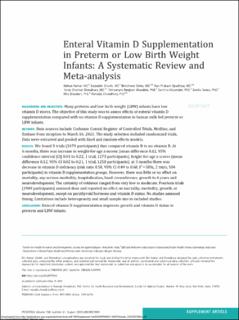Enteral Vitamin D Supplementation in Preterm or Low Birth Weight Infants: A Systematic Review and Meta-analysis
Kumar, Mohan; Shaikh, Saijuddin; Sinha, Bireshwar; Upadhyay, Ravi Prakash; Choudhary, Tarun Shankar; Chandola, Temsunaro Rongsen; Mazumder, Sarmila; Taneja, Sunita; Bhandari, Nita; Chowdhury, Ranadip
Journal article, Peer reviewed
Published version

Åpne
Permanent lenke
https://hdl.handle.net/11250/3063349Utgivelsesdato
2022Metadata
Vis full innførselSamlinger
Sammendrag
BACKGROUND AND OBJECTIVES
Many preterm and low birth weight (LBW) infants have low vitamin D stores. The objective of this study was to assess effects of enteral vitamin D supplementation compared with no vitamin D supplementation in human milk fed preterm or LBW infants.
METHODS
Data sources include Cochrane Central Register of Controlled Trials, Medline, and Embase from inception to March 16, 2021. The study selection included randomized trials. Data were extracted and pooled with fixed and random-effects models.
RESULTS
We found 3 trials (2479 participants) that compared vitamin D to no vitamin D. At 6 months, there was increase in weight-for-age z-scores (mean difference 0.12, 95% confidence interval [CI] 0.01 to 0.22, 1 trial, 1273 participants), height-for-age z-scores (mean difference 0.12, 95% CI 0.02 to 0.21, 1 trial, 1258 participants); at 3 months there was decrease in vitamin D deficiency (risk ratio 0.58, 95% CI 0.49 to 0.68, I2=58%, 2 trials, 504 participants) in vitamin D supplementation groups. However, there was little or no effect on mortality, any serious morbidity, hospitalization, head circumference, growth to 6 years and neurodevelopment. The certainty of evidence ranged from very low to moderate. Fourteen trials (1969 participants) assessed dose and reported no effect on mortality, morbidity, growth, or neurodevelopment, except on parathyroid hormone and vitamin D status. No studies assessed timing. Limitations include heterogeneity and small sample size in included studies.
CONCLUSIONS
Enteral vitamin D supplementation improves growth and vitamin D status in preterm and LBW infants.
